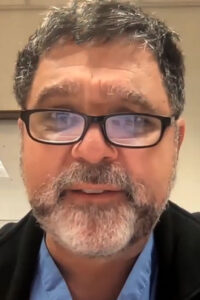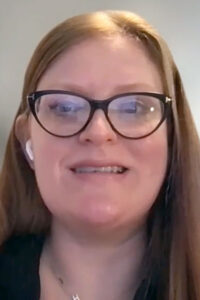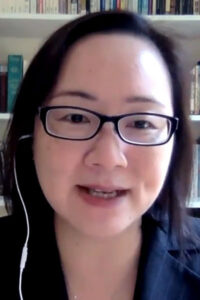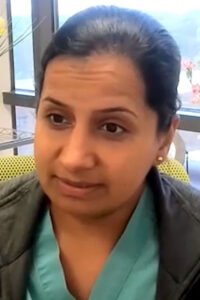
Although social media has been a popular communication tool for years, the COVID-19 pandemic has amplified the utility of social platforms to connect and collaborate with professional peers. The CHEST 2021 session, Social Media, Digital Scholarship, Teaching Portfolios: Everything You Wanted to Know was a primer for how to effectively integrate social media into the professional activities of clinicians, educators, and researchers.
Christopher L. Carroll, MD, FCCP (@ChrisCarrollMD), outlined the components of social media presence and how to leverage them for academic promotions and tenure. He is the Deputy Editor for Web and Multimedia for the journal CHEST®; past Chair of the CHEST Social Media Work Group; Physician Lead for Digital Access and Engagement and a member of the Promotion Committee at Connecticut Children’s; and Professor at the University of Connecticut School of Medicine.
“Social media is not going away. Universities need to figure out how to assess involvement and to give faculty credit for contributions to this space,” he said. “There are a lot of people in this space, and I think as clinicians, we are obligated to be there to help combat misinformation, and that is something we should be given credit for.”
One’s general presence on social platforms, such as Twitter or Facebook, involves what is being posted, following other users, and engaging with and endorsing content and users, he explained.
Digital media scholarship also includes creating and curating content and recognition for one’s contributions to the ongoing digital dialogue. Writing blogs, joining Twitter chats, speaking as part of a webinar, recording a podcast or videos, and designing online educational supplements all fall under this umbrella.
The only way to know with certainty how an academic promotion committee will view these activities is to know the institution’s specific criteria for promotion, but external recognition typically is a factor.
“That’s something that social media can help with,” Dr. Carroll noted.
When documenting social media engagement, be specific, he advises.
“Anything you’ve done you should put on your CV, and you should cite your role, if possible,” Dr. Carroll said.
Metrics for reach, impressions, scores, blog mentions, views, and similar data is also recommended.
“Perhaps even a better way of getting credit for these with your division chief, with your department chair, is to do these activities for an organization,” Dr. Carroll said. “Organizational titles carry significantly more weight than just writing your own blog.”

Nancy Stewart, DO (@nvhstewart), Assistant Professor, University of Kansas Medical Center, offered insight into digital engagement as an educator. Blogs, podcasts, online journal clubs, tweetorials, visual abstracts, and more can be used to build a digital scholarship teaching portfolio. These portfolios should be original, include high-quality content, and advance the field, she explained.
“You need to be transparent about your data sources, you want to be rigorous about validation—make sure that you fact check things—and make sure that it’s open access, and be open to reviewers,” Dr. Stewart said.
Social media also can be leveraged to develop international biomedical research collaborations, as evidenced by the creation of the GCS-NeuroCOVID Consortium in March 2020 from a WhatsApp chat group. This global collaborative to address neurological impacts of COVID-19 has grown to a combined network of more than 450 registered sites with the help of social media.

Sherry H. Chou, MD (@SherryChou399), Division Chief of Neurocritical Care and Associate Professor, Northwestern University Feinberg School of Medicine, and Adjunct Associate Professor, University of Pittsburgh, discussed some of the pros and cons of using social media in study dissemination experienced by the consortium.
Among the pros is the rapid dissemination of information with no associated costs, Dr. Chou said. Social media also can amplify a study’s reach.
“You have this incredible outreach to multiple communities and to ones that we didn’t initially anticipate,” Dr. Chou said. “We typically would reach out to medical and scientific communities, but with social media and news, you reach out to the general public, including patients who are actively suffering symptoms that are of interest.”
The instantaneous and international aspects of social media also create some challenges for researchers.
“When you share something on social media—when it’s a click and a share—it is hard to represent all of your scientific rigor in such a small amount of time and such limited content, and this leads to low specificity,” Dr. Chou said. “We had a lot of people reaching out to us who were not eligible for the study the way it was designed.”

Validation to meet regulatory and privacy requirements also could not be achieved through social platforms, she said.
During the presentation, Dr. Chou interviewed Aarti Sarwal, MD (@aartisarwal), Medical Director and Section Chief of Neurocritical Care, Atrium Health Wake Forest Baptist, and Professor, Wake Forest School of Medicine.
“The pandemic has really shown us how disruptive but transforming a tool social media can be, and as cautious custodians of science, as cautious custodians of medical information, it behooves us to use this destructive but transforming tool in a positive way to make science go forward,” said Dr. Sarwal.
To engage with CHEST on social media, follow @accpCHEST on Twitter and the American College of Chest Physicians on Facebook and LinkedIn.
ACCESS SESSIONS ON DEMAND
Registered CHEST 2021 attendees have continued access to 200+ educational sessions until October 1, 2022. Watch sessions on your own schedule and earn up to 50 CME credits/MOC points.
Don’t forget to claim your credit! The deadline is December 15, 2022, at 11:59 pm CT.





